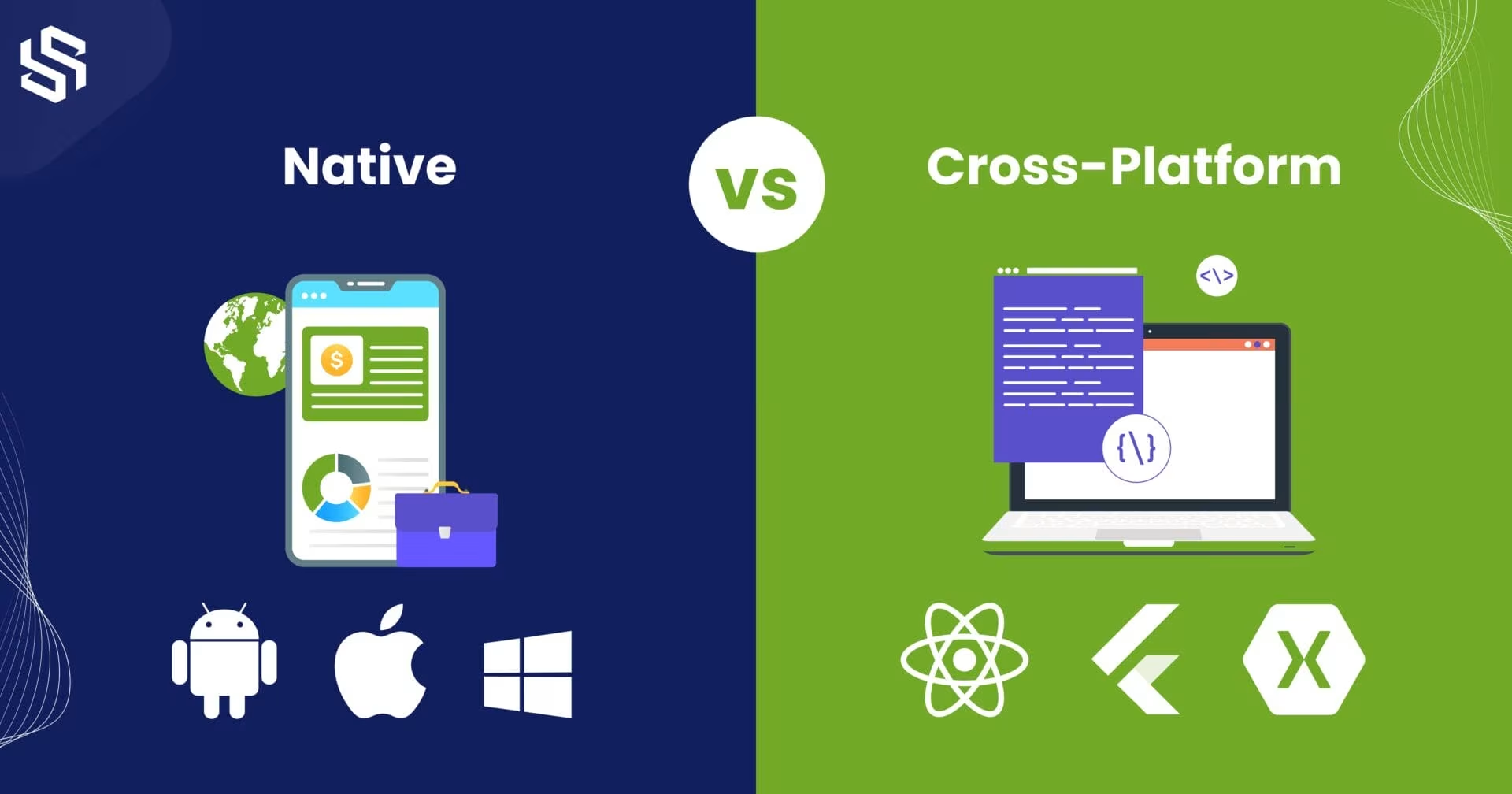Smartphones have become crucial for communication and entertainment. Developers are developing more apps for a huge range of users, from AR to weather.
To offer the best user experience, developers build mobile apps with the smartphone’s operating system in mind, either iOS or Android. Whether you are targeting Android or iOS, the operating system will influence your strategy for developing the application. Selecting the best mobile app development company in the USA ensures that you will be able to use their vast knowledge to develop an exceptional, platform-optimized application.
Native vs Cross-Platform Mobile App Development: Which One Should You Choose?
When it comes to building mobile apps, developers have two important options: native app development and cross-platform app development. Both approaches have their exceptional benefits, and the choice hugely focuses on your project’s goals, timeline, budget, and audience.
In this post, we’ll break down the key differences, advantages, and disadvantages of native vs. cross-platform development to help you decide which approach best fits your needs.
What is Native Mobile App Development?
Native mobile apps are built precisely for a particular platform, such as Android or iOS. These apps are written using the platform’s native programming languages, such as Java or Kotlin for Android and Swift or Objective-C for iOS. Native development also involves using platform-specific tools such as Android Studio or Xcode for iOS.
Examples of Native Apps:
- Google Maps
- Spotify
What is Cross-Platform Mobile App Development?
Cross-platform mobile apps, in contrast, allow you to create apps that work on both Android and iOS from a single codebase. This approach is made possible by frameworks such as React Native, Flutter, and Xamarin, which enable you to write one codebase that is collected into native code for both platforms.
Examples of Cross-Platform Apps:
- Instagram (React Native)
- eBay (Flutter)
- Walmart (React Native)
Native Mobile App Development: The Pros & Cons
Pros of Native Development:
- Superior Performance: Native apps are optimized for the particular platform, making them quicker and more responsive.
- Full Access to Device Features: Native apps have direct access to platform-specific APIs and hardware, such as GPS, camera, and sensors, enabling richer functionality.
- Better Security: Native apps can better use built-in security features of the platform, such as, encryption and biometric authentication.
- High-Quality UX: Native apps can offer a smoother, intuitive user experience by following platform-specific design guidelines.
Cons of Native Development:
- Higher Development Costs: Native apps need distinct development for Android and iOS, meaning you need diverse teams with experience in Java/Kotlin and Swift/Objective-C.
- Longer Development Time: Building apps for different platforms means more time spent on coding, testing, and deployment.
- Maintenance Challenges: Every platform’s updates and changes need individual attention, making maintenance more time-consuming.
Cross-Platform Mobile App Development: The Pros & Cons
Pros of Cross-Platform Development:
- Lower Development Costs: You only need one team to develop a single codebase for both Android and iOS, resulting in decreased overall development and labor costs.
- Faster Time to Market: Reusing code across platforms quickens the development process, enabling you to launch the app sooner.
- Easier Maintenance: Since there’s only one codebase, upgrading and maintaining the app becomes simpler and more effective.
- Code Reusability: A single codebase makes it easier to keep consistency and manage updates throughout several platforms.
Cons of Cross-Platform Development:
- Lower Performance: Cross-platform apps usually experience performance issues due to an additional layer of abstraction between the code and the native platform.
- Limited Access to Platform-Specific Features: While cross-platform frameworks provide access to numerous device features, they might not support all platform-specific capabilities, restricting functionality in some cases.
- Delayed Access to New Features: Cross-platform tools often lag behind the statement of platform-specific updates, meaning you might have to wait for support before using the up-to-date features on Android or iOS.
- Bigger App Size: Cross-platform apps are inclined to have larger file sizes due to the framework’s overhead, which can influence download and performance.
When to Choose Native Mobile App Development
Native development is the best option for you if:
- Performance is crucial: If your app needs high performance, such as for gaming or resource-intensive tasks, native development is often the superior choice.
- Security is a top concern: For apps that manage sensitive data, such as banking or health apps, native apps can offer stronger security measures.
- Access to advanced device features is required: If your app needs complete access to device abilities such as augmented reality, advanced camera features, or offline storage, then native is the way to go.
- Custom design and user experience: For apps that need highly customized, platform-specific designs, native development ensures you can personalize the experience precisely as you need.
When to Choose Cross-Platform Mobile App Development
Cross-platform development is perfect for you if:
- Time to market is vital: If you need to release your app fast to test the market or get feedback, cross-platform development is crucial.
- Budget is limited: For businesses or startups with a restricted budget, cross-platform development enables you to reach both Android and iOS users without replicating your development costs.
- Consistency across platforms is required: If you want a unified user experience throughout all platforms without spending time on platform-specific adjustments, cross-platform frameworks offer a reliable foundation.
- You need to keep a single codebase: If your app needs recurrent updates or bug fixes, using a single codebase for both platforms will streamline maintenance and ensure that your changes are functional across the board.
Which One Should You Select: Native or Cross-Platform?
There is no one-size-fits-all answer to whether native or cross-platform development is the right choice. Every approach has its advantages, and the decision mainly relies on the specific requirements of your app.
- If you have the resources and time for high performance, customization, and advanced features, native development is a good option.
- If you need to launch a cost-efficient app rapidly with a wider reach and negligible platform-specific requirements, cross-platform development will possibly serve you better.
Conclusion
Choosing between native and cross-platform app development comes down to your project’s objectives, budget, and timeline. Native apps surpass in performance, safety, and customization but come with greater costs and longer development times. Alternatively, cross-platform apps provide faster development, easier maintenance, and lower costs, but might not offer the same level of performance or access to platform-specific features. You can better navigate these choices and decide on the best course of action for your app by partnering with a trusted application development company in the USA
By cautiously considering your app’s needs, target audience, and long-term plans, you can make the right choice for your development process.



































